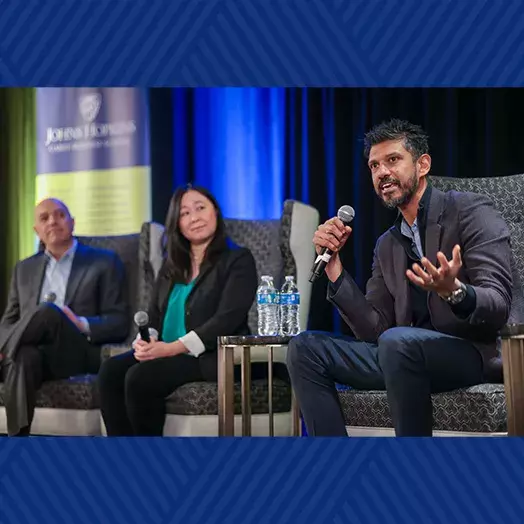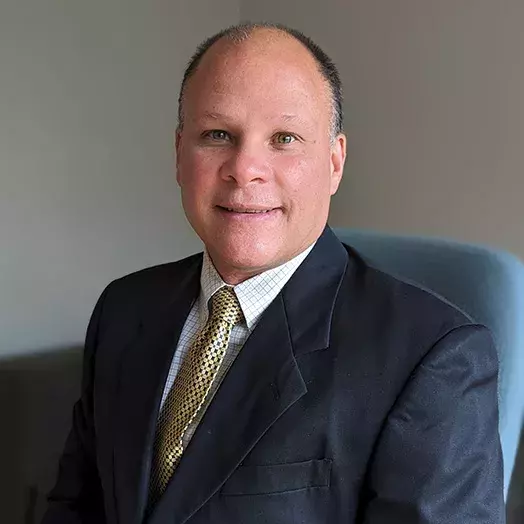Chan used her experience at Carey to transition to the technology sector and accelerate her career at Salesforce. Today she uses her career as a platform to combat the rising violence against Asian and Asian American communities.

Alum leans into identity and advances at Salesforce
Natasha Chan (MPH/MBA ‘17) has successfully pivoted from health care to higher education to tech, but navigating this career journey required building a skill set and finding the right culture that ultimately led her to Salesforce.
“While I’m in tech now, I started my career in health care,” Chan said. “I had spent a lot of time working in a variety of non-profit and hospital settings, and often witnessed the struggle to find balance between what is best for the patient and what is best for the bottom line. When I began to apply for graduate schools, I looked for a program that would equip me to have the heart of MPH with the mind of MBA. Of all the schools I applied for, Carey was the only one that specifically called out a credo of ‘business with humanity in mind.’ I knew I would have the strength of the Bloomberg MPH behind me, but also this new, innovative way thinking about business with a Carey MBA.”
Chan used her experience at Carey to transition to the technology sector and is now part of the Learning Design and Enablement Team at Salesforce, where she leads Global Soft Skills programs for the Customer Success Group.
In an industry driven by technology and automation, skills that underpin an individual’s ability to clearly communicate and form relationships are critical to standing out. Chan and her team create learning experiences to help CSG employees become stronger strategic partners for their customers.
Bringing her full self to work
Chan’s impact at Salesforce extends well beyond the traditional confines of her role.
“In a lot of organizations, I felt like I had to have my day job and then my side interests as well,” she said. “But at Salesforce, I’ve found that I am able to do all of things I love on top of my day job.”
As a self-taught graphic illustrator, Chan is able to flex her creative muscles by partnering on projects with Salesforce’s instructional design team. She also serves as Salesforce’s MBA Recruiting Liaison for Carey, and helps to lead one of Salesforce’s equality groups—Asiapacforce Chicago.
“As a proud Chinese-American, I am deeply passionate about Asian-American issues. Through my role with Asiapacforce, I’m able to immerse myself in issues and events that mean something to me and the Asian community,” Chan said. “It’s really great to not feel like I have to separate parts of my life.”
For Chan, the opportunity to influence Salesforce’s culture was a major draw to the company ranked sixth-best workplace by Fortune.
“Salesforce lives and breathes its values,” she said. “I really wanted to work for a company where I felt like they weren’t just talking the talk but were walking the walk as well.”
But leadership opportunities and meaningful conversations around equity can’t prevent the weight of the world from impacting Chan and her colleagues. On March 16, six Asian women were targeted and murdered in Atlanta in a series of shootings that killed eight people. And heightened violence against Asians and Asian-Americans, especially against the elderly, continues across the country.
“I, and a lot of my Asian colleagues, are really, really hurting right now,” said Chan. “I have family in San Francisco and Oakland where a lot of the attacks are happening in Chinatown – an area where my family often goes grocery shopping. On top of a pandemic, we now have to worry about our loved ones and their safety. That impacts my ability to focus at work.”
Despite the Salesforce culture she praises, Chan still hesitated to raise her concerns with her colleagues: “I was really nervous about being able to share my feelings with my team because I didn’t know how would they react. Would they be uncomfortable talking to me about these things? Would they notice that I wasn’t able to focus or that I seemed distracted?”
Ultimately, Chan had a candid conversation with her manager and shared her thoughts. Chan said her manager took the time to listen and empathize and gave Chan time at a team meeting to raise awareness and share ways for her colleagues to support all of their Asian and Asian- American team members.
“It’s so important for companies and leaders to think about how their employees are doing, both at and outside of work. It can be really hard to focus on business when there are other more pressing issues that may impact someone’s ability to be the best version of themselves at work,” she said.
In addition to a supportive team culture, Chan credits her mentors over the years for giving her the skills and support to be herself at work while advancing in her career.
“We stand on the shoulders of so many. I wouldn’t have been able to get here if I didn’t have mentors who gave me great advice,” she said. “As I evaluate leadership opportunities at this stage in my career, I want to make sure others thinking about their own paths can see someone who looks like them and who can speak up for them.”
Chan’s MBA ‘aha’ moment
Excited to pay it forward, Chan shared that her experiences at Carey empowered her to stand up for her values and pivot when necessary. As a graduate assistant, teaching assistant, and Student Group Leader, she took full advantage of the Carey offerings, but she points to a much more abstract takeaway as her biggest win from her MBA.
Chan made the challenging decision to pivot away from a focus on health care in her second year of the MPH/MBA program. Graduation loomed, and she wasn’t sure what her next move would be. When she was at her most stressed, she found herself sitting at the Department of Motor Vehicles after misplacing her driver’s license.
The supersized lore of DMV inefficiencies played out in front of Chan. She was given a number — A6 — without any clear rhyme or reason. The person behind her— G5. And the person before her — B3. There were multiple long lines, but it was unclear which line she needed to join.
Chan found herself calculating flow time to determine how long each line and process would take, and she recalled problem sets from her operations course.
“I realized in that moment, if I hadn’t gone to graduate school, I might have just sat there stewing in my grumpiness, but business school taught me to be in the moment and focus on how the world is working around me. Looking at situations with this new lens helped me see that how an organization operates ultimately comes down to choices, and there are always ways to iterate and improve,” Chan said. “That was a big ‘aha’ moment for me: You have the ability to affect outcomes in the world.”


